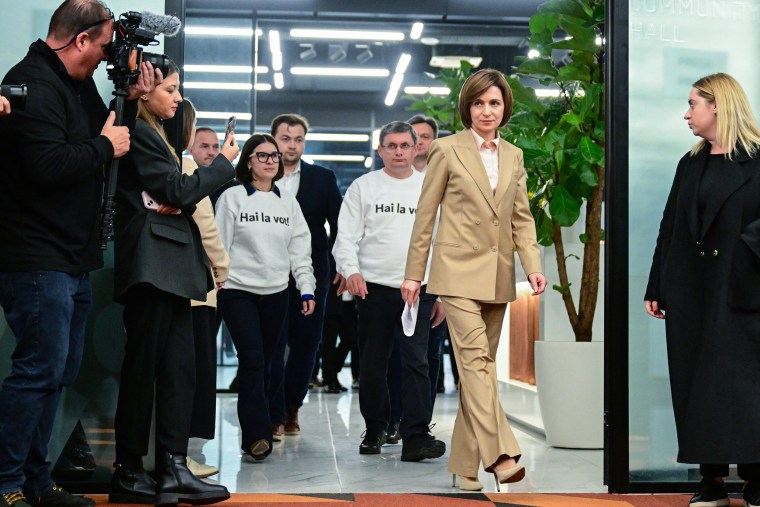Moldova leader decries vote meddling after slim majority backs joining the E.U.
A slim majority of 50.39% voted “yes” in Moldova’s crunch referendum on European Union accession, preliminary results showed, after President Maia Sandu said that Sunday’s twin votes had been marred by “unprecedented” outside interference.
The knife-edge finish — with fewer than 1% of ballots still to be counted — is far from a resounding endorsement of the pro-EU path that Sandu has pursued over four years at the helm of the small ex-Soviet republic tugged between Russia and the West.Sandu took 42% of the vote at a presidential election that was held simultaneously, while her main rival, former prosecutor-general Alexandr Stoianoglo, won 26%, a stronger result than polls had predicted.
The result sets the scene for a tightly fought run-off between the two on Nov. 3. Stoianoglo has said that, if elected, he would build a “balanced” foreign policy involving ties with the EU, the United States, Russia and China.

Sunday’s twin votes, which took place after persistent allegations of election meddling, were seen as a test of the southeast European nation’s aspirations to join the EU by 2030 and escape Moscow’s orbit for good.
Moldova’s future has been in the spotlight since Russia’s invasion of neighboring Ukraine to the east. Russia maintains a small contingent of troops stationed as peacekeepers on Moldova’s breakaway region of Transdniestria.
In the run-up to Sunday’s referendum, polls had shown clear majority support for joining the EU. A “yes” result means a clause will be added to the constitution defining EU accession as a goal.
In the early hours of Monday, Sandu told Moldovans there was “clear evidence” that criminal groups working together with “foreign forces hostile to our national interests” had sought to buy off 300,000 votes.
She said this amounted to “fraud of unprecedented scale” and that Moldova would “respond with firm decisions”.
“Criminal groups… have attacked our country with tens of millions of euros, lies and propaganda, using the most disgraceful means to keep our citizens and our nation trapped in uncertainty and instability,” she said.
The Kremlin denounced the votes in Moldova as “unfree”, casting doubt on what it said was a “hard-to-explain” increase in votes in favor of Sandu and the EU, and challenging the Moldovan leader to “present evidence” of meddling.
The EU leapt to Sandu’s defence, saying Moldova had faced “really unprecedented intimidation and foreign interference by Russia and its proxies ahead of this vote”.
The tight referendum result could put Sandu in a weaker position going into the second round since she has championed EU integration.
Moldova began the long process of formal accession talks in June and under Sandu has aimed to join by 2030. Ties with Moscow have deteriorated as Sandu condemned the Kremlin’s invasion of Ukraine and diversified energy supply away from Russia.
Stoianoglo boycotted Sunday’s referendum, calling it a ruse to boost Sandu’s haul at the election.
In the run-up to the vote, authorities made repeated statements alleging Russian-backed attempts to meddle in the vote by fugitive tycoon Ilan Shor, who lives in Russia.
Russia, which accuses Sandu’s government of “Russophobia,” denies interfering, while Shor denies wrongdoing.
The police have accused Shor, who was sentenced to jail in absentia for fraud and a role in the theft of $1 billion, of trying to pay off a network of at least 130,000 voters to vote “no” and support “our candidate” at the election.
Shor has openly offered on social media to pay Moldovans to convince others to vote in a certain way and said that was a legitimate use of his money.
In the early hours, he declared Moldovans had voted against the referendum, telling Sandu: “Today I congratulate you, you lost the battle.”
Political analyst Valeriu Pasha said the “yes” vote — initially behind during the vote counting — had edged ahead only because of unusually high turnout among Moldovans living abroad, who mostly support EU integration.
“With such elections, in which dozens of (percentage points) can be bought, it will be very difficult for us going forward. But we must learn lessons and learn to fight this phenomenon,” he wrote on Facebook.





